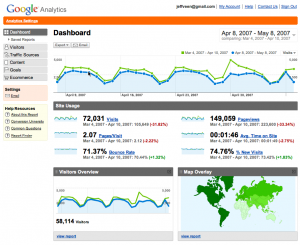14.7 Audience Analytics Data
Analytics are being used by all types of communications professionals as a way to learn more about the nature of the audience. An ever-changing suite of services, tools, companies and providers allow message creators to track how audiences are interacting with content online, on mobile devices, on social networks and in other ways. Google Analytics, Chartbeat, Adobe Digital Marketing Suite, Signalnoi.se, and Salesforce Marketing Cloud are just a few of the players in the audience analytics field.
A PR professional might partner with a real-time sentiment marketing firm to understand what consumers are saying through social media. For example, when several Golden Globe Awards actresses walked the red carpet with slicked-back hairdos, social media Tweeters reacted as they watched. Some of those commenters almost immediately received a Tweet from L’Oreal Paris showing them how to achieve the same look at home, and offering coupons. The real-time sentiment marketing firm Poptip (working on behalf of L’Oreal) was looking for hairdo chatter, analyzing which conversations were appropriate for the response (ignoring Tweets from males about how hot an actress was, for instance) and sending a message that reflected the client’s perspective and product to the right audience at the right moment.

An advertising professional might look at Google Analytics for evidence of how well a client’s web page is reaching the target audience before deciding how to position the next set of promotional messages. The report from Google Analytics will tell the ad professional how much traffic the website is getting, where that traffic is coming from and how visitors behave on the site. The ad professional can also monitor mobile app traffic and social media activities around that client’s brand. All of this information would help inform the ad professional about possible strategies for the next campaign the client wants to launch.
A news editor might use a service such as Signaloi.se to see how stories about a particular topic have trended on social media (Facebook, Twitter, etc.) with the audience in the past before deciding how to direct her reporters’ follow-up work on that issue. Or the news ad sales team may use the information from a service such as Chartbeat to show potential advertisers data about the news site’s audience and how effective their ads would be in reaching that audience if they placed an ad on the website.
Many news organizations are building their own “dashboards” that allow them to track audience behavior on their websites and social platforms in real time. The dashboard helps journalists understand where a story’s traffic is coming from, how it is being shared, whether readers are interacting with related content on the site, how much attention the story is getting, etc.
For example, The New York Times has created a tool it calls the Package Mapper. It assesses data directly from the NYT web site logs to create a network diagram that shows editors how readers are navigating through a package of related stories and features in real time. During the 2014 winter Olympics in Sochi, Russia, most of the Times’ stories were generated by their sports reporters and were published in the sports section of the newspaper and website. However, one afternoon social media exploded with commentary about a Times article (produced by a metro reporter not assigned to the Olympics) that described an incident where the Russians blocked a shipment of Chobani yogurt from reaching American athletes. The Package Mapper immediately detected the social media interest in the yogurt story and editors were able to make an appropriate link in the sports section to the yogurt story so sports section readers could find it.
Understanding how to use the burgeoning suite of message and audience analytics data tools is becoming a basic expectation for communicators entering the profession. You would be well-served to familiarize yourself with the most important tools in the specific area of communications work in which you are interested and learn the basics of how those tools are used in that field.

